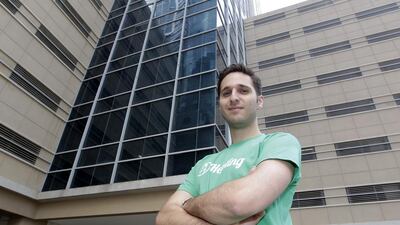Domestic cleaning is by its nature a low-tech activity, but one start-up wants to mop up in the UAE by taking the business online.
Helpling – the so-called “Uber for cleaners” – launched in Germany in April, and is now in 11 countries worldwide including Australia and Brazil.
Like the often controversial car-booking app, Helpling allows users to book online, specify their location, pay via credit card and rate the service once the job is completed. It launched in the UAE in January, with the global selling point that users can book a cleaner online in less than 60 seconds.
Cleaning is just the latest everyday service to be pushed online, given the rise of internet shopping, flight bookings and ordering a cab. But is there really a need to bring the humdrum task of booking a cleaner on to the web?
For the Helpling Middle East co-founder Manar Alkassar, who previously worked for an ITsecurity start-up in Germany and launched his first entrepreneurial venture at 16, the answer is a clear “yes”.
The 27-year-old German-Syrian entrepreneur says: “People are used to buying food and booking flights online. We see ourselves as a digitiser of the household market, to bring an offline concept online.”
Benefits of the service are as diverse as reducing the hassle of spelling out your address over the phone to reducing illegal employment of cleaning staff in the UAE, Mr Alkassar says. In the UAE residents who employ cleaners with no working visas face steep penalties.
“We want to sort out this mess in the market,” says Mr Alkassar. “There are Dh50,000 to Dh100,000 fines for the people who employ illegal cleaners. And we want to help to bring this business into legality.”
Unlike in many other markets where it works directly with freelancers, in the UAE Helpling has ties with outside agencies that employ Filipino cleaners. Those agencies offer visas, housing and salaries equal to or greater than the minimum of Dh1,500 a month set by the Philippine authorities, says Mr Alkassar.
Users pay Dh35 an hour, compared with the €12.90 (Dh53) charged in Germany, with Helpling’s commission varying according to its contract with the cleaning partner. Mr Alkassar declined to specify how many cleaners are on the books, saying only that the number is in double figures. Helpling may be less than a year old, but it already has expansion plans in the Middle East, following its launch in the UAE by the Middle East Internet Group, a joint venture by Germany’s Rocket Internet and the South Africa-based telecoms group MTN.
Mr Alkassar says the company plans to be “everywhere in the Middle East”, although he did not specify which countries are top priority. But Helpling faces competition in its regional ambitions. One potential rival is the Egypt-based Taskty, which allows users to book cleaners online, along with other household services, such as plumbing, maintenance and insect control.
Ahmed Galal, the chief executive of Taskty, says the company intends to establish a presence in Saudi Arabia imminently, and possibly other Arabian Gulf markets such as the UAE and Kuwait later. The arrival of Helpling proves there is demand in the Middle East, Mr Galal says. But web businesses in the region still face difficulties compared with other markets where internet use is higher, he cautions.
“It’s a little bit more challenging than in the US or Europe, because the user is less tech-savvy,” he says. “At some point we will create a culture and people will get used to ordering services online.” Taskty has already attracted support from Flat6Labs, a tech incubator based in Cairo, and a second round of funding of $100,000 from investors in Egypt and Saudi Arabia. Mr Galal says it is in the process of closing another investment round, although he declined to give details.
Rony El Nashar, founding partner of the Dubai-based SeedStartup Venture Fund, says Helpling faces competition in the UAE from both the offline – “brick and mortar” – cleaning firms, as well as live-in maids, which the service does not offer.
“Traditionally, in the UAE, the lion’s share of the demand has been for live-in maids. It’s clear though, that in recent years, the hourly segment of the market has started to grow,” says Mr El Nashar.
Some on-demand services, such as Uber, have been highly disruptive in their chosen markets. London was brought to a standstill one day last summer by regular taxi drivers protesting about the unfettered rise of the car-booking smartphone app in the city.
Yet Mr Alkassar does not envisage bands of cleaners, mops held aloft, protesting at the UAE launch of Helpling. Conversely, the new internet service will actually give a boost to local offline businesses, he says.
“I don’t think we’re a direct threat to cleaning firms,” he adds. “We are partnering up with agencies, so they also profit from our growth.”
business@thenational.ae
Follow The National's Business section on Twitter

